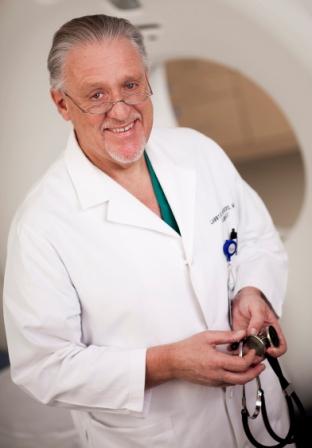A friend of mine was chatting with her mother on the telephone recently. Her mom mentioned that she hadn’t been feeling well for the past week or so and that she was having a little trouble breathing. Her chest felt a little … tight. So the mom went to the doctor for a quick check-up — although she was sure nothing was wrong — and within a few hours was having double bypass surgery. The blockage was severe and she’d made it to the hospital just in the nick of time.
Dr. Larry Weathers, a physician at Mercy Heart and Vascular Clinic, knows all about heart disease and says women are less likely to heed the signs. For one thing, he says, the symptoms are sometimes subtle. But it’s vitally important to reduce stress, shun cigarettes, eat healthily, exercise and learn what you can about the disease — particularly since it’s the No. 1 killer of women, even above cancer.
Since February is Heart Health Month, we spoke to Dr. Weathers about a woman’s heart. If you missed Dr. Weathers’ video podcast recently in Doc Talk, click HERE to hear directly from him about how women experience heart attacks differently.
Q: What’s different about how women and men experience heart attacks?

A: The mechanism of heart attack for men and women are different and therefore they present with different symptoms. Men usually rupture a plaque in a coronary and a clot forms instantly in the vessel the size of a straw and severe pain occurs immediately. But, in women the mechanism is more likely to be erosion of the plaque and the clot forms more slowly and the symptoms are less dramatic.
Q: What are the warning signs of a heart attack in a woman?
A: Shortness of breath with minimal exertion and chest pain or “pressure”. It’s more likely to be shortness of breath and indigestion. Occasionally there’s tingling in the arm (a symptom more common in men).
Q: How big a role does stress play in heart attacks?
A: Stress probably plays a major role in heart attacks as proven by increased heart attacks during disasters like 9/11 and the San Francisco earth quake. Some good stress relief techniques? Japa meditation, yoga, walking, cycling, swimming.
Q: How big a role does a history of health problems in your family play into your heart issues?
A: The most important risk factor for heart attack and stroke is family history.
Q: How does dental health affect heart health? (For example, we’ve heard that flossing is important for your heart as well as your teeth.)
A: The mouth is a source of bacteria which can easily be passed into the bloodstream from brushing and flossing. But good dental hygiene is very important to heart health.
Q: What are new medical advances in heart health?
A: Screening with coronary calcium scores and hsCRP are both predictors of future heart attacks
Q: Do most women talk themselves out of getting checked for heart issues?
A: Probably and studies have shown that women are less likely to get state-of-the art care.
Q: How can you reverse heart disease after symptoms appear?
A: It’s very difficult to confirm reversal, but it has been proven in a few studies using an invasive tool called IVUS or intravascular ultrasound. In Aristotle and Camelot studies, a combination of Lipitor and Norvasc called Caduet reversed it.
Q: Why should a young woman be concerned about heart health?
A: Early detection like breast and cervical cancer are paramount since heart disease is the #1 killer of women.
Q: At what age should a person get a heart screening without any symptoms?
A: Women at 40 and men at 50.
Q: Why do you have such a heart for heart health?
A: In 1957 50% of all heart attacks presented with sudden cardiac death and in 2007 50% presented with sudden cardiac death. No change in 50 years.
Q: You’ve only lived in NWA for a short time – what do you think about the area so far?
A: NWA is a multicultural, financial, economic, progressive and intellectual nugget with immeasurable potential and I am excited to be a small part of it.
